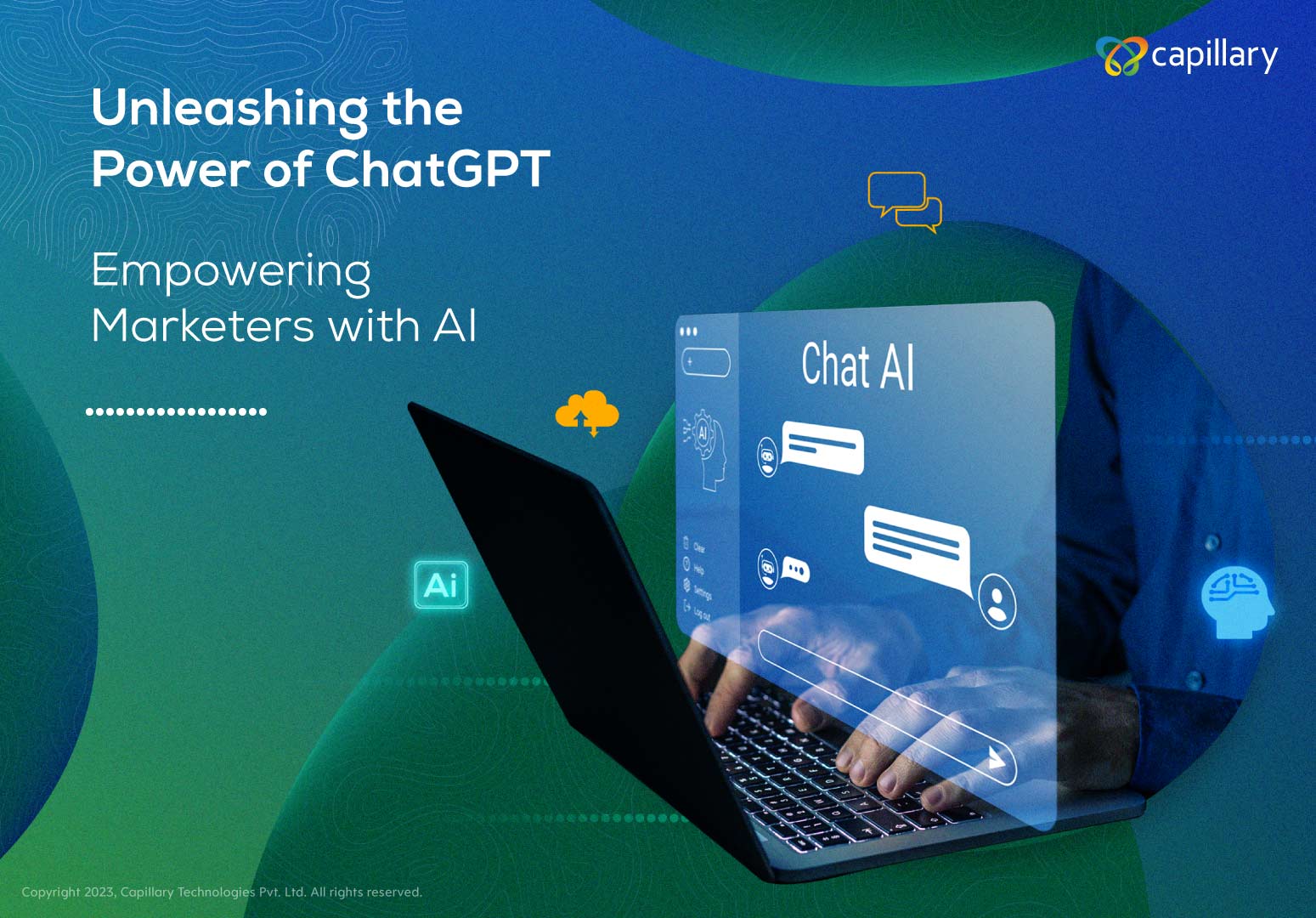- Design industry shaping loyalty programs
- Integrate easily and go live quicker
- Deliver hyper-personalized consumer experiences
Blue Rewards from Al Futtaim Group Shares Loyalty Success Stories and Evolution. Watch Podcast >
Capillary Announces 2nd Annual Captivate 2025 Summit: Transforming Loyalty Management with New AI Tech Read more >

The world of marketing is constantly evolving, with businesses seeking innovative ways to engage customers and drive conversions. In recent years, Artificial Intelligence (AI) has emerged as a game-changer in the marketing landscape. One such powerful tool that has revolutionized customer interactions is ChatGPT. Developed by OpenAI, ChatGPT is an advanced language model designed to generate human-like text responses, enabling businesses to enhance their marketing efforts significantly.
In this blog, we will explore the capabilities of ChatGPT and how it empowers marketers to take their strategies to new heights.
ChatGPT is an AI language model that belongs to the GPT (Generative Pre-trained Transformer) family, specifically GPT-3.5 (Capillary’s enterprise customers can leverage this directly on the platform through AskAira). It’s a machine learning-based technology that has been trained on vast amounts of data, allowing it to understand and generate human-like text in a wide range of contexts. This versatile tool can converse, answer questions, create content, and even simulate various scenarios, making it an asset for marketers.
One of the key challenges in marketing is capturing and retaining the attention of potential customers. With ChatGPT, marketers can create interactive and personalized experiences for their audience. By integrating AI into websites or social media platforms, businesses can offer real-time responses to customer inquiries, leading to higher engagement rates and increased trust.
Content marketing plays a crucial role in attracting and educating customers. ChatGPT can assist marketers in generating high-quality and tailored content across various formats, such as blog posts, social media captions, and email newsletters. It can suggest topic ideas, optimize headlines, and even provide a coherent structure for the content piece.
Providing exceptional customer support is essential for brand loyalty and customer satisfaction. ChatGPT can act as a virtual support agent, offering instant assistance to customers’ queries. Its ability to understand natural language allows it to provide accurate and helpful responses, addressing common concerns and guiding customers through troubleshooting processes.
Personalization is the key to an effective marketing campaign. AI tools can analyze customer data, such as preferences, behavior, and past interactions, to offer personalized product recommendations and marketing offers. This level of personalization enhances customer experience, leading to higher conversion rates and improved brand loyalty.
Marketers are constantly striving to optimize their campaigns for better results. ChatGPT can assist in A/B testing by suggesting different variations of ad copies, email subject lines, and call-to-action statements. By leveraging the power of AI, marketers can quickly identify high-performing variations and refine their strategies accordingly.
Challenges and limitations
ChatGPT, like other AI language models, faces several challenges and limitations. One significant limitation is its lack of contextual understanding, often resulting in responses that may seem plausible but are factually incorrect. Additionally, ChatGPT heavily relies on the training data, which can introduce biases and struggles with handling ambiguity and abstraction. Integrating ChatGPT into CRM systems also raises privacy and security concerns, requiring robust measures to protect customer data. Scalability, training efforts, and addressing cultural nuances pose further challenges, and the potential for unintended outcomes and lack of emotional intelligence may affect customer interactions negatively. Despite these limitations, being aware of these challenges and taking appropriate steps can help harness the power of ChatGPT while ensuring responsible and effective use.
Best practices for integrating ChatGPT in CRM System
Integrating ChatGPT-3 with CRM (Customer Relationship Management) system can greatly enhance customer interactions and improve the overall efficiency of your marketing and support efforts. However, to ensure seamless integration and maximize the benefits, it is essential to follow some best practices. Here are the key steps and considerations for integrating ChatGPT into your CRM system:
The advent of ChatGPT has revolutionized the marketing landscape by offering powerful AI-driven solutions to enhance customer engagement, create personalized content, and optimize marketing campaigns. With its ability to understand natural language and generate human-like responses, ChatGPT has become an indispensable tool for marketers looking to stay competitive in the digital era.
As AI technology continues to advance, the potential applications in marketing are limitless. By embracing the power of AI, businesses can unleash a new wave of creativity and efficiency, ultimately driving growth and success in today’s dynamic market. Speak to a loyalty and customer engagement expert at Capillary to learn how you can leverage AI via the Capillary Loyalty Platform.

August 30, 2023 | 4 Min Read
The AI wave is stirring things up in the marketing domain. R